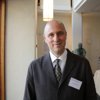Fritextsökning
Artiklar per år
Innehållstyper
-

AZ gets approval for drug targeting rare disease – it may reduce cortisone dependence
AstraZeneca’s drug Fasenra gets an expanded indication in the EU and is now approved as a treatment for the rare autoimmune disease known as Churg-Strauss syndrome.
-

A new life science cluster formed – “We are very strong in talent”
Stockholm and Uppsala’s joint life science cluster aims to be among the best in Europe. Pontus Holm, Life Science Coordinator for Region Stockholm, says the decision to create a joint profile for the two cities is strongly supported. He mentions that around 50 stakeholders were asked last winter if they were in favour of a joint cluster and that “the answer was a resounding yes”.
-

Tre forskare får Nobelpriset i kemi 2024
Årets Nobelpris i kemi går till David Baker, Demi Hassabis och John M. Jumper för att ha lyckats bygga nya proteiner och förutspå proteiners komplexa struktur.
-

This years Nobel prize in medicine – “Changed the understanding of how genes are controlled”
This year’s Nobel Prize in Physiology or Medicine goes to the discovery that small RNA molecules, known as microRNAs, control how genes are regulated. Understanding the mechanism has changed our view of human biology and evolution, says KI Professor András Simon.
-

Caroline Leksell Cooke ny chef på Elekta
Elekta har rekryterat Caroline Leksell Cooke till ny Senior Vice President och Head of Neuro Solutions. Hon börjar sin nya tjänst den 1 november.
-

Anna Törner: ”Mom, do you think you’ll ever get married again?”
”I realize I’m slowly descending into that familiar statistical rabbit hole, where life’s biggest uncertainties are reduced to point estimates and confidence intervals”, Anna Törner writes in a column.
-

Anna Törner: ”Mamma, tror du att du kommer att gifta om dig?”
”Jag inser att min hjärna är på väg ned i det statistiska kaninhålet, där frågor besvaras med punktskattningar och konfidensintervall.” Det skriver Anna Törner i en krönika.
-

“We should avoid surgery if we can”
Since February this year, she has been Scientific Director Life Science at the Karolinska Institutet. Life Science Sweden met Anna Martling for a talk about role models, surgery and Sweden’s strengths and weaknesses in medical research.
-

Ingrid Lönnstedt: ”The confidence interval and its width”
Always keep an eye on the width of your and others’ confidence intervals, writes Ingrid Lönnstedt in a science column.
-

Takeover bid is being completed – Japanese company acquires Calliditas
Japanese company Asahi Kasei completes the bid for Calliditas Therapeutics after reaching over 90 percent of the shareholding. Callidita's board has now decided to apply for delisting of the company´s share from Nasdaq Stockholm.
-

Anna Törner: Yes, I Am Sick, But Not Weak
”People often say that someone who is ill only has one wish—to get better. But I think that is not true. Someone who is ill also longs to be understood, to be respected, to not have their identity overshadowed by their condition”, writes Anna Törner in a column.
-

Thumbs down for lecanemab in the EU – “Very surprised”
The Azheimer's drug lecanemab has received a negative assessment from the European Medicines Agency’s Committee for Medicinal Products for Human Use (CHMP), according to an announcement made by the Agency last week. Bioarctic’s CEO Gunilla Osswald describes the reactions after the announcement as a surprise and disappointment.
-

Bayer has cut 1,500 roles – so far
German chemical and pharmaceutical group Bayer cut more than 1,500 roles in the first quarter alone– and most of them were management positions.
-

Total pipeline of pharmaceutical companies reaches a record high – 22,921 medicines are currently being developed
Despite the difficult economic times, pharmaceutical companies have never developed as many new drugs as now.
-

Carl Borrebaeck – professor and serial entrepreneur with a taste for speed
Award-winning cancer researcher, the founder of many listed companies, and constantly in the academic and commercial spotlight for decades. However, Carl Borrebaeck, Professor of Immunotechnology at Lund, is not yet satisfied. “We have a new, potentially super exciting project in the pipeline,” he says.
-

Forskaren in Hagastaden now inagurated
The real estate company Vectura's life science center in Hagastaden, Forskaren, is now inaugurated. The opening was attended by people from the industry, politicians and royalty.
-

Ancient DNA provides new insights – “The immune system lost its job”
Ancient bone remains from our ancestors have provided new insights into the prevalence of multiple sclerosis. By looking back in time, researchers can provide a possible explanation for why the disease is more prevalent in northern Europe.
-

Nocebo – the evil twin that makes you feel worse
The placebo effect is well known in healthcare, but not so its opposite: nocebo. “The effect is small, but it can have major repercussions,” says Uppsala researcher Charlotte Blease, co-author of a book on the phenomenon.
-

The Covid pandemic accelerated the development of cancer vaccine
The Covid pandemic gave a major boost to the vaccine field. The Danish biotech company Expres2ion Biotechnologies, which is developing a vaccine against breast cancer, testifies to this.
-

Study: Popular diabetes treatment is not associated with thyroid cancer
Concerns raised about an association between GLP-1 analogues, used to treat diabetes and obesity, and an increased risk of thyroid cancer are not supported by an extensive Scandinavian study.
-

Beta-blockers are often given unnecessarily, a study finds – “This will affect future practice”
Patients who have suffered a minor heart attack do not benefit from beta-blockers, according to a major new study that may change guidelines for cardiac care.
-

Radioactive tracer to measure effect of drug towards Crohn’s disease
A radioactive tracer developed by Astra Zeneca and the Karolinska Institutet may play a major role for patients with Crohn's disease. That is the belief of Maria Belvisi at AstraZeneca.
-

Specific proposals and targets top the universities’ desired priorities
What are the universities’ expectations for the update of the national life science strategy? Life Science Sweden posed the question to representatives from Karolinska Institutet and Sahlgrenska Academy.
-

Samuel Lagercrantz: ”Will the Swedish life science strategy be updated with precision?”
What will the Swedish government focus on in the life science strategy that is being updated? And what should be prioritized in the strategy? Life Science Sweden's editor-in-chief Samuel Lagercrantz highlights three areas.